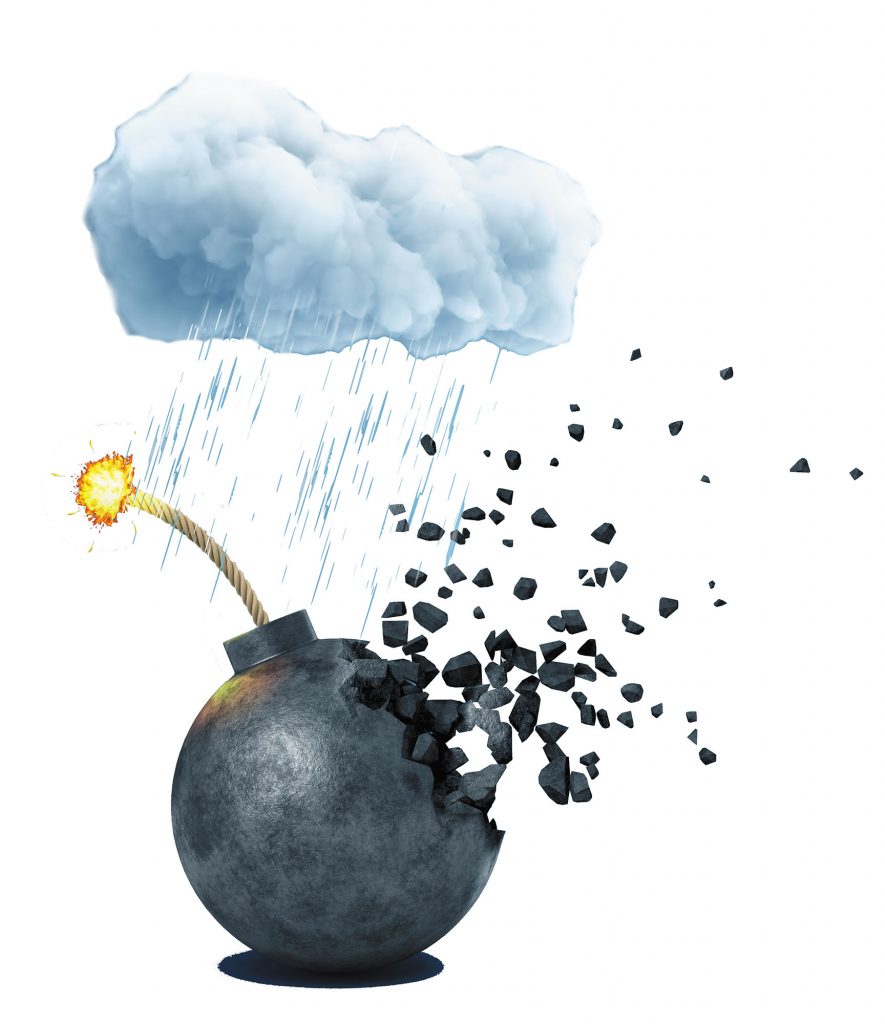How to help create a safe and secure environment for front-line associates and guests
by ZOHREEN ISMAIL
Picture this scenario: Your hotel staff member is standing respectfully behind the front desk as she watches a guest enter the hotel lobby without a face mask. The staff member politely asks, “Sir, would you please cover your nose and mouth with our complimentary face mask?” The guest refuses and begins to argue and raise his voice. What should she do in this situation?
The COVID-19 pandemic has introduced new challenges for hotel staff members, whether it be front-desk associates interacting with guests or staff members cleaning rooms. The operational process has changed – and it’s difficult to predict for how long. Chuck Kelley, an industry expert, spent 32 years working with Marriott International beginning as an assistant restaurant manager and working his way up to executive vice president responsible for Marriott’s Caribbean/Latin American region. Kelley is currently a partner with Cayuga Hospitality Consultants, LLC, a network of independent hospitality consultants. Today’s Hotelier had the pleasure of speaking with Kelley as he shared his expertise on handling crises situations.
“First step is to offer the guest a mask,” Kelley offered. “Second, explain the reasoning for the mask; clarify that it’s for the safety and protection of everyone around you. Lastly, you don’t want to leave the responsibility of further challenging the guest with the front-line associate. Have a protocol in place that escalates it to the next level of management,” Kelley explained.
Safety and security have significantly risen in the hierarchy of guest expectations since the pandemic. “Before the pandemic, everyone expected safety and security, but it was unintrusive,” Kelley added. “Today, guests want cleanliness and security to be much more visible. Guests want to see that high-traffic areas and touchpoints in hotels are being sanitized on a regular basis.”
 DEFINING TOUGH SITUATIONS
DEFINING TOUGH SITUATIONS
Many of our readers have been in the hospitality industry for decades, and they have experienced and navigated through all types of challenging situations. The one type of scenario that can be described as the most controversial is one that relates to tough encounters with hotel guests, because in those interactions, there are many things in jeopardy, including brand reputation, customer satisfaction, and customer loyalty.
“An obvious example would be the individual at the hotel bar who had too much to drink,” Kelley pointed out. “Bartenders and cocktail servers need to be trained to diffuse those situations.” And hotel staff members want to be able to mitigate these tense situations without compromising on excellent customer service.
“One aspect to handling this type of situation is to always remember to get the individual away from the group or other guests,” Kelley explained. “Handle it one-on-one as opposed to out in the open where the upset or difficult guest has an audience.”
Kelley shares examples of asking the guest to speak outside and always ensuring that the option of asking a senior-level management staff member to assist is present.
 RESPONDING TO A CRISIS ONLINE
RESPONDING TO A CRISIS ONLINE
The increasing growth of social media and the internet itself requires hotels to maintain positive reputations online while also communicating effectively online. And this applies to crisis management and communication.
Excellent customer service was always at the forefront for hotel owners and hospitality professionals. A major part of security is ensuring your guests feel safe when arriving at your property. However, what can you do if unhappy guests have left bad reviews online? As Kelley shared, one way to tackle this is to have the conversation offline. “For example, if a guest was asked to leave because they did not wear a face mask then left a terrible review online, then have senior management contact them offline. Try to avoid a lot of back and forth with a guest online. That’s a lose-lose situation,” he explained.
 LEARNING FROM PAST CRISES
LEARNING FROM PAST CRISES
The pandemic is not the first crisis the hospitality industry has faced. Hospitality professionals are resilient and flexible, always adapting to the needs of society and the communities they serve. In 2010, hospitality professionals in New York City had to respond to a bed bug crisis on social media. About 13,140 bed bug complaints were reported, 7,000-plus cases were confirmed, and nearly 11% of all U.S. hotel reviews on TripAdvisor complained about bed bug infestations. Looking back at this example can provide insights into establishing the importance of having a crises response plan.
So, how did hotels respond to this health-related crisis? More than half of the hotels in the area made it a priority to provide regular updates regarding guest concerns and offered a sympathetic attitude toward the situation. About 83% of hotels tried to remind their guests of their previous amenities that were unaffected by the bed bugs.
 DEVELOPING TRUST WITH YOUR GUESTS
DEVELOPING TRUST WITH YOUR GUESTS
One of the reasons why home-sharing platforms such as Airbnb and Vrbo have become increasingly popular is the opportunity for guests to communicate with their host before arriving at the property. This communication between guest and host builds trust and excitement.
The guest experience begins as soon as your guests book their room. Having your staff call your guests a day prior to their arrival to go over what to expect and any new guidelines that are in place can help let your guests be informed and answer any questions before they arrive at your property.
“Having a quality product, excellent amenities, and a first-class loyalty program is the price of entry. If you want to truly earn the loyalty of a customer then excellent service is what makes a difference,” Kelley said. “I also think a diverse workforce broadens the understanding of your customers.” By taking extra measures to ensure your staff is reaching out to guests and preparing them for what to expect, it can lessen the number of upset guests.
 ONE COMMON THEME
ONE COMMON THEME
The concept of safety and security certainly isn’t new for hotel owners and operators. The best practices of communicating expectations with your guests, isolating a guest from the crowd to discuss a tense situation, and ensuring your staff members have the resources and tools they need are industry standards. “More visible security will become a norm,” Kelley said. “Safety and security were always in the background, and now it’s becoming more visible to guests.”
As the hospitality industry continues to evolve, owners and operators are adapting to changing situations while keeping best practices at the forefront to ensure the safety and security of all of your guests, associates, and properties.

Keys to success
According to Chuck Kelley, partner with Cayuga Hospitality Consultants, LLC, every hotel should have crisis-management plans in place. And in that plan, owners and operators may need to imagine all the potential scenarios that may arise in a guest-and-associate interaction. Next, strategize and ensure all the staff members feel prepared to handle any situation. Kelley shared the four key components of a crisis-management plan.
1. Priorities
The guests and employees are always the top priority, followed by assets and recovery. Excellent customer service is the foundation for hotel owners and operators, so customer service should be a pillar even in a time of crisis.
2. Policy
Every hotel, whether a large franchise or a smaller boutique hotel, follows policies that are consistent with the region and city in which they operate. Understanding your local area’s disaster management policies is important. For example, if your state requires a face mask to be worn in public places, that rule should be implemented at your property.
3. Procedures
As a hotel owner, your operational business plan should include procedural guidelines on how to interact with guests in challenging situations. For example, do you amend the cancellation policy for COVID-related cancellations? Having a clear set of procedures that everyone follows will reduce the number of upset or angry guests, and it will be invaluable to have a playbook when diffusing a tense situation.
4. Details
Assign an easy location where all hotel staff members can access important information they may need in a crisis situation. For example, make emergency phone numbers readily available for the staff to make them feel more equipped and safe in handling challenging situations.
Kelley also emphasized the importance of training for all hotel associates. “It’s all about proactive planning and training,” he said. “Whether it’s a pandemic, weather-related, or a food-borne illness, you want training in place so frontline associates know how to correctly and safely manage tough situations.”
An ounce of prevention
 Many confrontations arise out of mere misunderstandings. Nowhere is that more evident than when your staff is dealing with an irate guest and neither of the two parties appear to be communicating on the other’s level.
Many confrontations arise out of mere misunderstandings. Nowhere is that more evident than when your staff is dealing with an irate guest and neither of the two parties appear to be communicating on the other’s level.
With that in mind, here are several key steps to take before any metaphorical landmines are detonated in your lobby.
Define “crisis.” Having a guest whose room key doesn’t work doesn’t warrant a nuclear-level reaction from the staff. But if a guest is assaulted, that certainly requires a different response. Outline the general criteria for what constitutes a management-level problem and be sure your staff knows the difference.
Timing is everything. Often, the speed at which someone responds to a problem or complaint can change how the situation is resolved. Put steps in place to allow your staff to move quickly to resolve difficult situations and act with autonomy.
Set attitudes. If your staff tends to view guests as an annoyance, it stands to reason they won’t treat complaints – serious or slight – with the respect they deserve.
Listen. Anyone who has worked in any form of customer service has experience in conflict management. Have you asked your staff recently for their input on how they’ve dealt with unruly guests or challenging coworkers?
Follow the money. Hospitality is an incredibly tight labor market. Properties are losing (or gaining) staff over seemingly slight pay differences. Staff members who are happy with their compensation are more likely to go the extra mile to proactively resolve problems and not introduce conflict themselves.




